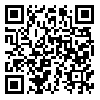Fri, Jan 30, 2026
[Archive]
Volume 12, Issue 34 (2019)
J Med Edu Dev 2019, 12(34): 22-33 |
Back to browse issues page
Download citation:
BibTeX | RIS | EndNote | Medlars | ProCite | Reference Manager | RefWorks
Send citation to:



BibTeX | RIS | EndNote | Medlars | ProCite | Reference Manager | RefWorks
Send citation to:
hashemiparast M S, Jahanban Esfahlan A, Vakili M M. The Challenges of Applying Theoretical Knowledge in the Clinical Settings: A Qualitative Study. J Med Edu Dev 2019; 12 (34) :22-33
URL: http://edujournal.zums.ac.ir/article-1-1073-en.html
URL: http://edujournal.zums.ac.ir/article-1-1073-en.html
1- Department of Public Health, Maragheh University of Medical Sciences, Azarbayjan sharghi,Iran , mina.hashemi26@yahoo.com
2- Department of nursing, Maragheh University of Medical Sciences, Azarbayjan sharghi,Iran.
3- Department of Health Education & Health Promotion, Zanjan University of Medial Sciences, Zanjan, Iran.
2- Department of nursing, Maragheh University of Medical Sciences, Azarbayjan sharghi,Iran.
3- Department of Health Education & Health Promotion, Zanjan University of Medial Sciences, Zanjan, Iran.
Abstract: (10911 Views)
Background & Objective: In recent years, insufficient clinical education and the lack of integration with theoretical knowledge has caused problems in patients’ care. This study aimed to identify the barriers of applying learned lessons in the classroom in clinical settings
Materials and Methods: A qualitative content analysis approach was adopted. Individual semi-structured interviews with clinical trainees, faculty members and experienced clinical staffs were done. Data collected until data saturation and concurrently analyzed, assisted by MAXQDA 10
Results: In this study, the five main categories of “tendency toward routine care in clinical settings”, “inefficient teaching-learning”, “lack of confidence in clinical adequacy”, “lack of supportive professional relationships”, and “difference between the nature of theory and practice” were extracted as the barriers of utilizing theoretical knowledge in the clinical settings.
Conclusion: Transfer of learning is influenced by several factors with different natures. This phenomenon creates in a structure composed of the climate of clinical setting, lack of professional support in workplace, distrust and contradiction between the nature of theory and practice. Therefore, elimination of barriers requires improving the cultural, educational and professional settings.
Materials and Methods: A qualitative content analysis approach was adopted. Individual semi-structured interviews with clinical trainees, faculty members and experienced clinical staffs were done. Data collected until data saturation and concurrently analyzed, assisted by MAXQDA 10
Results: In this study, the five main categories of “tendency toward routine care in clinical settings”, “inefficient teaching-learning”, “lack of confidence in clinical adequacy”, “lack of supportive professional relationships”, and “difference between the nature of theory and practice” were extracted as the barriers of utilizing theoretical knowledge in the clinical settings.
Conclusion: Transfer of learning is influenced by several factors with different natures. This phenomenon creates in a structure composed of the climate of clinical setting, lack of professional support in workplace, distrust and contradiction between the nature of theory and practice. Therefore, elimination of barriers requires improving the cultural, educational and professional settings.
Article Type : Orginal Research |
Subject:
Medical Education
Received: 2018/08/4 | Accepted: 2019/09/4 | Published: 2019/09/29
Received: 2018/08/4 | Accepted: 2019/09/4 | Published: 2019/09/29
Send email to the article author
| Rights and permissions | |
 |
This work is licensed under a Creative Commons Attribution-NonCommercial 4.0 International License. |





